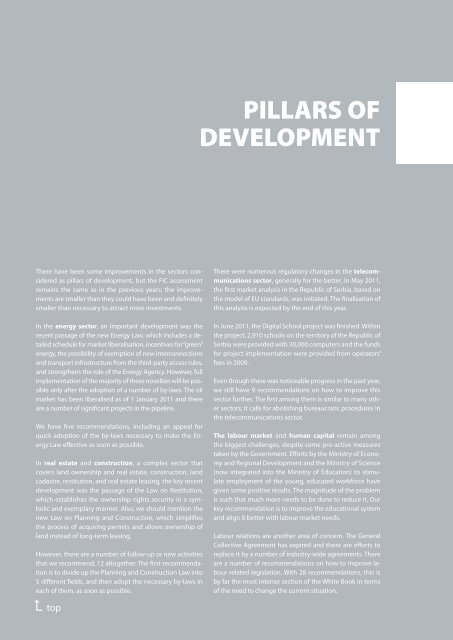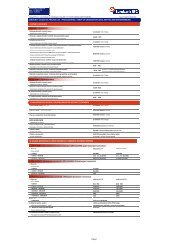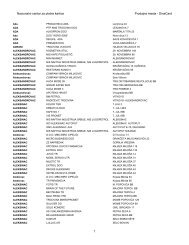Fic rEcommEndationS - Eurobank EFG
Fic rEcommEndationS - Eurobank EFG
Fic rEcommEndationS - Eurobank EFG
You also want an ePaper? Increase the reach of your titles
YUMPU automatically turns print PDFs into web optimized ePapers that Google loves.
There have been some improvements in the sectors considered<br />
as pillars of development, but the FIC assessment<br />
remains the same as in the previous years: the improvements<br />
are smaller than they could have been and definitely<br />
smaller than necessary to attract more investments.<br />
In the energy sector, an important development was the<br />
recent passage of the new Energy Law, which includes a detailed<br />
schedule for market liberalisation, incentives for “green”<br />
energy, the possibility of exemption of new interconnections<br />
and transport infrastructure from the third-party access rules,<br />
and strengthens the role of the Energy Agency. However, full<br />
implementation of the majority of these novelties will be possible<br />
only after the adoption of a number of by-laws. The oil<br />
market has been liberalised as of 1 January 2011 and there<br />
are a number of significant projects in the pipeline.<br />
We have five recommendations, including an appeal for<br />
quick adoption of the by-laws necessary to make the Energy<br />
Law effective as soon as possible.<br />
In real estate and construction, a complex sector that<br />
covers land ownership and real estate, construction, land<br />
cadastre, restitution, and real estate leasing, the key recent<br />
development was the passage of the Law on Restitution,<br />
which establishes the ownership rights security in a symbolic<br />
and exemplary manner. Also, we should mention the<br />
new Law on Planning and Construction, which simplifies<br />
the process of acquiring permits and allows ownership of<br />
land instead of long-term leasing.<br />
However, there are a number of follow-up or new activities<br />
that we recommend, 12 altogether. The first recommendation<br />
is to divide up the Planning and Construction Law into<br />
5 different fields, and then adopt the necessary by-laws in<br />
each of them, as soon as possible.<br />
� top<br />
PILLARS OF<br />
DEVELOPMENT<br />
There were numerous regulatory changes in the telecommunications<br />
sector, generally for the better. In May 2011,<br />
the first market analysis in the Republic of Serbia, based on<br />
the model of EU standards, was initiated. The finalisation of<br />
this analysis is expected by the end of this year.<br />
In June 2011, the Digital School project was finished. Within<br />
the project, 2,910 schools on the territory of the Republic of<br />
Serbia were provided with 30,000 computers and the funds<br />
for project implementation were provided from operators’<br />
fees in 2009.<br />
Even though there was noticeable progress in the past year,<br />
we still have 9 recommendations on how to improve this<br />
sector further. The first among them is similar to many other<br />
sectors; it calls for abolishing bureaucratic procedures in<br />
the telecommunications sector.<br />
The labour market and human capital remain among<br />
the biggest challenges, despite some pro-active measures<br />
taken by the Government. Efforts by the Ministry of Economy<br />
and Regional Development and the Ministry of Science<br />
(now integrated into the Ministry of Education) to stimulate<br />
employment of the young, educated workforce have<br />
given some positive results. The magnitude of the problem<br />
is such that much more needs to be done to reduce it. Our<br />
key recommendation is to improve the educational system<br />
and align it better with labour market needs.<br />
Labour relations are another area of concern. The General<br />
Collective Agreement has expired and there are efforts to<br />
replace it by a number of industry-wide agreements. There<br />
are a number of recommendations on how to improve labour<br />
related legislation. With 28 recommendations, this is<br />
by far the most intense section of the White Book in terms<br />
of the need to change the current situation.




